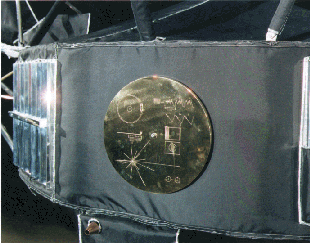Voyager's
Interstellar Outreach
Program |
 |

VOYAGER�S GREETINGS TO THE UNIVERSE
The Voyager spacecraft will be the third and fourth human artifacts to
escape entirely from the solar system. Pioneers 10 and 11, which
preceded Voyager in outstripping the gravitational attraction of the
Sun, both carried small metal plaques identifying their time and place
of origin for the benefit of any other spacefarers that might find them
in the distant future. With this example before them, NASA placed a
more ambitious message aboard Voyager 1 and 2-a kind of time capsule,
intended to communicate a story of our world to extraterrestrials.
The Voyager message is carried by a phonograph record-a 12-inch
gold-plated copper disk containing sounds and images selected to
portray the diversity of life and culture on Earth. The contents of the
record were selected for NASA by a committee chaired by Carl Sagan of
Cornell University. Dr. Sagan and his associates assembled 115 images
and a variety of natural sounds, such as those made by surf, wind and
thunder, birds, whales, and other animals. To this they added musical
selections from different cultures and eras, and spoken greetings from
Earth-people in fifty-five languages, and printed messages from
President Carter and U.N. Secretary General Waldheim.
Each record is encased in a protective aluminum jacket, together with a
cartridge and a needle. Instructions, in symbolic language, explain the
origin of the spacecraft and indicate how the record is to be played.
The 115 images are encoded in analog form. The remainder of the record
is in audio, designed to be played at 16-2/3 revolutions per second. It
contains the spoken greetings, beginning with Akkadian, which was
spoken in Sumer about six thousand years ago, and ending with Wu, a
modern Chinese dialect. Following the section on the sounds of Earth,
there is an eclectic 90-minute selection of music, including both
Eastern and Western classics and a variety of ethnic music.
Once the Voyager spacecraft leave the solar system (by 1990, both will
be beyond the orbit of Pluto), they will find themselves in empty
space. It will be forty thousand years before they make a close
approach to any other planetary system. As Carl Sagan has noted, �The
spacecraft will be encountered and the record played only if there are
advanced spacefaring civilizations in interstellar space. But the
launching of this bottle into the cosmic ocean says something very
hopeful about life on this planet.�

Information About the Earth and Its Inhabitants Included on the Record
 Images
Images
 Sounds
Sounds
 Languages
Languages
 Music
Music
 Message from The UN Secretary General
Message from The UN Secretary General
 Message on the Record's Cover
Message on the Record's Cover
Want to know more about Voyager's record?

The definitive work
about the Voyager record is "Murmurs of Earth" by Sagan, Drake, Lomberg
et.al. Basically, this book is the story behind the creation of the
record, and includes a full list of everything on the record. "Murmurs
of Earth", originally published in 1978, was reissued in 1992 by Warner
News Media and includes a CD-ROM that replicates the Voyager record.
Unfortunatelly, this book is now out of print, but it is worth the
effort to try and find a used copy or browse through a library copy.
 Return to Voyager Home Page
Return to Voyager Home Page

Last Updated: 11/6/2000
Comments ? Questions ? Problems ? Your Feedback is Welcome!




 Images
Images
 Sounds
Sounds
 Languages
Languages
 Music
Music
 Message from The UN Secretary General
Message from The UN Secretary General
 Message on the Record's Cover
Message on the Record's Cover

 Return to Voyager Home Page
Return to Voyager Home Page
